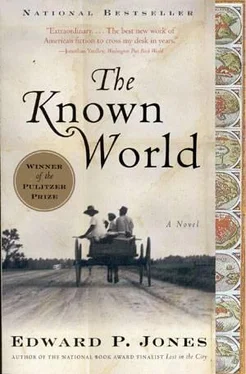Fern Elston had chosen not to follow her siblings and many of her cousins into a life of being white. She stayed in Manchester County where everyone knew what she was-a free Negro, though she was as white as any white person. Part of why she stayed was Ramsey Elston, a free Negro who came from north of Charlottesville. Had she gone anywhere else and passed as white, the color of her husband would have made her suspect. While he was quite light-skinned, he was not as light as she was and it was most evident that he was colored. She would have been a white woman in the rest of the world with a Negro husband, and that would have limited her world almost as much as their just living as a colored man and his colored wife. And being a white wife might have gotten her husband killed.
But it had never crossed Fern’s mind to pass as white. Not caring very much for white people, she saw no reason to become one of them. She was known throughout Manchester as a formidable woman, and being educated had only piled more formidability on top of what she had been born with. Sheriff John Skiffington’s patrollers came to dread seeing her if she was on the road after dark, which was rare for her.
In the early days of the patrollers, the first thing out of her mouth when they stopped her was “I will not abuse you in word or deed and I do not expect you to abuse me in word or deed. And I do not want my servant abused,” the servant being whichever one of her slaves was driving her at the time. Then she would produce papers showing she was a free woman and that would be followed by a bill of sale for the slave. She waited patiently for them to look over the papers. Some of the patrollers could not read, and she was just as patient with them, waiting as the illiterate man made a show of pretending to read. She knew people were not born knowing how to read. She did not say “Good day” when they stopped her, and she did not say “Good-bye” when they let her go on her way. “Pass on,” she would say to the servant.
If there was something “disagreeable” with the patrollers she would tell William Robbins, not Sheriff John Skiffington, about it the very next day. Once, a patroller, Harvey Travis, who could read, had been displeased with the coldness of her manner and had crumbled up the papers and thrown them in her lap. “Just git now,” he said. “Pass on,” she said to the servant, with the same tone she spoke when she had not been abused. She went to Robbins that next day. She had never gone around to the back door of a white person’s home and she did not do it that day. The servant who drove her went to the back, found a slave who was washing clothes and told her that Mistress Fern would like a word with Master Robbins. By the time Fern’s servant got back to her in the carriage, Robbins was coming down the stairs of the verandah.
“Mr. Robbins,” she said, “I have had a disagreeable episode with one of the patrollers and I fear that if something is not done, there will be more episodes.” She remained in the carriage the whole time as Robbins stood beside it. Both of them paid taxes to fund the patrollers but that was not something that would have meant anything to the patrollers.
He knew her well enough to know that she had not gone to Skiffington. “I will look into it, Fern. I will see what I can do.”
“If you can do something, you will have my gratitude.”
“Then I will work even harder to get something done.”
No patroller ever abused her again. Always after that, when she saw the patrollers on the night road, she would stop and produce the papers even before they had asked. In time, all the patrollers came to know her and did not require the papers. But she pulled them out nevertheless. “We know who you are,” they would say. She said nothing. And then, when it became clear that she never had to stop again in her life, she would still stop and do what she had been doing all along.
Ramsey Elston’s gambling was making them poorer, though it was a poverty that the great majority of the county, white and free black, would have been very comfortable with. He did not gamble in the county. Instead, he would go at least two counties over to find white men sporting enough to gamble with a Negro. And he had to be sure that if he won, they would not be so resentful as to take their losses out on his hide, and then, after the beating, take their money back. He was often gone for three or four days, a week at the most, and in the early time of their marriage it was something she could bear. And, too, he usually won. The acreage that they had was producing, and then there was the money from relatives in Richmond and Petersburg. The money had been coming for years without there ever having been an agreement to it. A bank in Richmond or Petersburg would communicate with the one bank in Manchester and there would be money in Fern’s account. She suspected that the relatives were sending it as Fern-you-keep-our-secret money, but the last thing she would have done was tell the world she had relatives who were passing. She knew them all, had played with some as children, slept beside them in their beds, but she no longer thought of them as people who had the same blood as hers.
Ramsey, especially in the days before the arrival of fellow gambler Jebediah Dickinson, would return and be the most attentive of husbands for weeks and weeks until the need to be around a table of money and cards and men and cigars took hold of him again. That gambling world two counties away tugged at him and she could see it in the way he lumbered through their home, the way he nudged the puppies out of his way with his foot. He needed to be back to that world, all of it, even the sight of that one servant whose one job it was to fan the cigar smoke away with a newspaper none of the gamblers had even bothered to read.
Fern was not a woman to wait for her husband at the window. But she did pine for him. He would tell her the very day when he was coming back. “Don’t wash,” he would say before he left. “Don’t you bathe till I get back.” This was hard for her in the beginning, for she had been raised with the notion that the lack of cleanliness put one closer to those laboring in the fields. “I need to bathe, Mr. Elston,” she said. “I want to bathe.” “Do it after I get back.” “But I will perspire all over myself in the meantime, all the way down to my poor ankles.” “Sweat me up a river, I don’t care. I’ll swim in it. Just don’t bathe.” She tried to avoid her students at such times, for she had taught them, from Dora to Caldonia, the same notion about cleanliness. Ramsey would come back, generally in the late evening, and find her in their bedroom. “I have been a dutiful wife, Mr. Elston.” He would laugh. “And I a dutiful husband, Mrs. Elston,” and she would believe him, night after night, until Jebediah Dickinson came. Then Ramsey would start to undress her, piece by slow piece, the one candle in the room wearing itself away even faster now down to a nub. Long before he had finished undressing her, she would grow heavy with wanting him and feel as if she would drop to the floor, and that was when he would kiss her throat, making the first contact with her skin, tasting for the first time the buildup of salt. The kiss would revive her and she would live until she became heavy once more and he had to kiss her throat again. “Have you bathed, Mrs. Elston?” “I have not bathed, Mr. Elston,” each word being such an effort and yet so very necessary. “I have been a dutiful wife.”
This was in the spring and early summer of their lives together. There was a saying in that part of Virginia that candles burned brighter in the spring and summer of a year because of how the wind came down from the mountains and gave the flames more air to breathe. Other people said no, that they had seen candles burn just as brightly in the fall, and even in the winter when the air wasn’t as nice. Fern Elston subscribed to the latter notion.
Читать дальше












